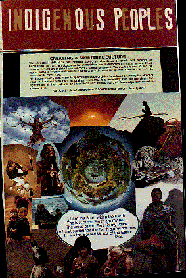|
The Kluane First Nations experiences exemplify those faced by many Aboriginal communities across Canada when it comes to having their voice heard in the international arena. Shawn Allen, Executive Assistant for the Land Claims division in Kluane, explained that her community is more concerned with grassroots environmentalism.The Kluane region, located in Burwash, Yukon, spans 325 square miles with a population of 200. It is recognized as an UNESCO World Heritage Site and was declared a protected zone by UNESCO in 1981. "We are currently going through land claim negotiations, and that brings everything down to a grassroots focus," she said. "I'm not saying that we don't want to look at the international sphere, it's just that we have to deal with other issues first." She was unfamiliar with the Indigenous People's recommendations set out by Agenda 21, a United Nations environmental agreement signed in Rio de Janeiro, Brazil five years ago. However, her community has just applied for an Action 21 grant. They want to use the grant to help clean up some of the derelict, rusted equipment left by a mining operation which has been detrimentally affecting the animals in the area. Action 21 is a community-based initiative developed as a result of Canada's response to Agenda 21. It provides funding to local people who come-up with environmentally-related projects.
Gitksan is located in North Central part of British Columbia and is ecologically unique in that many major watersheds, such as the Skeenawa River and the Fraser Basin, originate from the region. Ryan describes the Gitksan as salmon people with a river culture. Both are unhappy that the United Nations does not recognize the Aboriginal peoples' as sovereign nations; however, they acknowledged that the United Nations Human Rights Commission has helped in promoting their situation in Canada in the international arena. "What we are most concerned about is preserving the land," he said. "Aboriginal societies are fighting to enable themselves to carry out the sustainable activities as they have traditionally done." To find out more about Aboriginal culture, check out Native web. |

